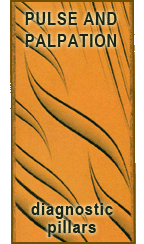Archive for the ‘Pulse Class’ Category
The Thin Pulse (Xi Mai)

Thin Pulse (細脈 Xi Mai) key point: thin. Indications: qi deficiency is unable to command the blood hence, it doesn’t fill the vessels.
 Last modified: July 28, 2009 ·
Last modified: July 28, 2009 ·  al ·
al ·  No Comments
No Comments
 Tags: Diagnosis, Palpation · Posted in: Pulse Class, Pulse-Palpation
Tags: Diagnosis, Palpation · Posted in: Pulse Class, Pulse-Palpation
The Soggy, Weak-Floating, Soft Pulse (Ru Mai)

Soggy Pulse (濡脈 Ru Mai, weak-floating, soft) Key points: superficial, thin, forceless. Indications: damp depresses the vessels, qi and blood cannot easily flow through the vessels leading to the thin, forceless and ultimately rootless pulse.
 Last modified: July 27, 2009 ·
Last modified: July 27, 2009 ·  al ·
al ·  No Comments
No Comments
 Tags: Diagnosis, Palpation · Posted in: Pulse Class, Pulse-Palpation
Tags: Diagnosis, Palpation · Posted in: Pulse Class, Pulse-Palpation
The Faint, Minute Pulse (Wei Mai)

Faint Pulse (微脈 Wei Mai, minute) Key points: thin, forceless, vague. Indications: yin, yang, qi, or blood deficiency: four substances can’t fill vessel.
 Last modified: July 26, 2009 ·
Last modified: July 26, 2009 ·  al ·
al ·  No Comments
No Comments
 Tags: Diagnosis, Palpation · Posted in: Pulse Class, Pulse-Palpation
Tags: Diagnosis, Palpation · Posted in: Pulse Class, Pulse-Palpation
The Frail, Weak Pulse (Ruo Mai)

Frail Pulse (弱脈 Ruo Mai, weak) Key points: deep, thin, forceless. Indications: deficiency of yin, yang, qi, or blood: if deeper, more yang deficiency, if pulse lacks root, more yin deficiency.
 Last modified: July 25, 2009 ·
Last modified: July 25, 2009 ·  al ·
al ·  No Comments
No Comments
 Tags: Diagnosis, Palpation · Posted in: Pulse Class, Pulse-Palpation
Tags: Diagnosis, Palpation · Posted in: Pulse Class, Pulse-Palpation
The Scattered, Dissipated Pulse (San Mai)

Scattered Pulse (散脈 San Mai, dissipated) Key points: superficial, scattered without root, uneven rhythm. Indications: exhaustion of qi, functional failure of the zang fu organs.
 Last modified: July 24, 2009 ·
Last modified: July 24, 2009 ·  al ·
al ·  No Comments
No Comments
 Tags: Diagnosis, Palpation · Posted in: Pulse Class, Pulse-Palpation
Tags: Diagnosis, Palpation · Posted in: Pulse Class, Pulse-Palpation
The Long Pulse (Chang Mai)

Long Pulse (長脈 Chang Mai) Key point: long. Indications: normal (tall person, or young and healthy), Liver yang rising, excessive interior heat.
 Last modified: July 23, 2009 ·
Last modified: July 23, 2009 ·  al ·
al ·  No Comments
No Comments
 Tags: Diagnosis, Palpation · Posted in: Pulse Class, Pulse-Palpation
Tags: Diagnosis, Palpation · Posted in: Pulse Class, Pulse-Palpation
The Short Pulse (Duan Mai)

Short Pulse (çŸè„ˆ Duan Mai) Key point: short Indications: (Forceful) qi stagnation: qi commands blood, the vessel is not filled lengthwise.
 Last modified: July 22, 2009 ·
Last modified: July 22, 2009 ·  al ·
al ·  No Comments
No Comments
 Tags: Diagnosis, Palpation · Posted in: Pulse Class, Pulse-Palpation
Tags: Diagnosis, Palpation · Posted in: Pulse Class, Pulse-Palpation
The Moving, Stirred, Spinning Bean, Bouncing Pulse (Dong Mai)

Moving Pulse (動脈 Dong Mai, stirred, spinning bean, bouncing) Key points: Short, round, slippery and rapid, forceful in the middle position (compared to others)Indications: pain: qi and blood stagnation causes a disharmony of ascending and descending of the qi and blood.
 Last modified: July 21, 2009 ·
Last modified: July 21, 2009 ·  al ·
al ·  No Comments
No Comments
 Tags: Diagnosis, Palpation · Posted in: Pulse Class, Pulse-Palpation
Tags: Diagnosis, Palpation · Posted in: Pulse Class, Pulse-Palpation
The Slippery, Rolling Pulse (Hua Mai)

Slippery Pulse (滑脈 Hua Mai, rolling) key point: all indications point to earth phase Indications: food stagnation: any stagnation in the Earth element can lead to dampness.
 Last modified: July 20, 2009 ·
Last modified: July 20, 2009 ·  al ·
al ·  No Comments
No Comments
 Tags: Diagnosis, Palpation · Posted in: Pulse Class, Pulse-Palpation
Tags: Diagnosis, Palpation · Posted in: Pulse Class, Pulse-Palpation
The Choppy, Hesitant, Rough, or Sluggish Pulse (Se Mai)

Choppy Pulse (澀脈 Se Mai, hesitant, rough, sluggish) Key points: un-smooth, short, mutable, changes rapidly in both rate and strength. Indications: (forceful) stagnation of qi, blood, food, or phlegm: pathogens block the vessels and impair the blood circulation.
 Last modified: July 19, 2009 ·
Last modified: July 19, 2009 ·  al ·
al ·  No Comments
No Comments
 Tags: Diagnosis, Palpation · Posted in: Pulse Class, Pulse-Palpation
Tags: Diagnosis, Palpation · Posted in: Pulse Class, Pulse-Palpation
